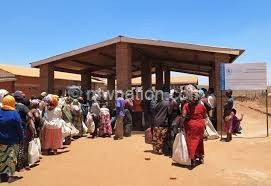UNHCR raises alarm over plight of 35 000 refugees
The United Nations High Commissioner for Refugees (UNHCR) and the World Food Programme (WFP) have raised alarm over the plight of at least 35 000 refugees and asylum seekers in Malawi if K3 billion ($4.2 million) for food assistance is not found.
In a joint statement released last Friday, the two UN agencies warned of an imminent disruption of food assistance to 35 000 refugees and asylum seekers in Malawi.

“Without additional funding, food rations will be suspended from next January, the peak of the lean season between harvests. That would risk reversing gains made to date in tackling malnutrition.”
“Refugees are very often exceptionally resilient, but life for thousands of refugee and asylum seeker families will be dire without food. This will have a devastating impact on the health and nutrition of thousands of families unless more support is immediately made available,” UNHCR Malawi Representative, Monique Ekoko is quoted as saying.
According to WFP Malawi representative, Benoit Thiry who is also quoted in the statement, WFP assistance makes up over 90 percent of the food consumed by refugees living in Malawi.
In a telephone interview yesterday, WFP head of communications Cheu Mita said the current funding for food assistance ends next month; hence the call for help to avert a possible catastrophe.
With just about slightly over a month before January, Mita expressed optimism that the international community will respond favourably and save the situation.
“Usually, when we sent an alert like this one, some country comes up with support even when it is just for one month [and] it keeps us going to the next month. Later you find some other countries making donations for upcoming months,” she said.
To ensure that refugees are not at the mercy of donations, Mita said WFP and UNHCR are working with the government to find lasting solutions to the plight of the refugees and asylum seekers, mainly through the Comprehensive Refugee Response Framework (CRRF) to allow them own land for farming which is not the case currently.
“We are also working towards profiling vulnerabilities to determine appropriate support. We know there are some who are well off than others. Currently, we are providing same support to all without considering vulnerabilities, moving forward we need to target our support depending ,” Mita added
When contacted for a comment leader of refugees and asylum seekers from the Democratic Republic of Congo, who form over half of the total number of refugees Lucien Sango, said he was not aware of a possible food cut come January next year.
“I cannot comment much but if it is true, I am afraid many people will suffer because they have no other source of income. We hope the government will continue helping us as usual” he said.
Each person in the refugee camp receives 13.5 kilogramme of maize per month, 1.5 kilogrammes of beans, 1.5 kilogrammes of soya –made flour for porridge and 0.75 kilogrammes of cooking oil.
A few years ago government announced plans to relocate Dzaleka refugee camp which is more crowded from Dowa to Katiri in Karonga where refugees and asylum seekers are expected to have more access to land for farming but such plans are yet to materialise.





